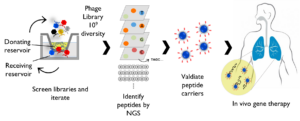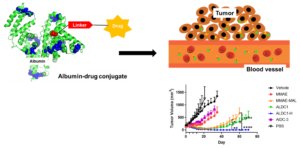Combinatorial biology to evolve drug delivery systems that overcome biological barriers
Drugs must accumulate at the site of action at therapeutic amounts without incurring toxicity in healthy tissues to achieve efficacy. Unfortunately, it is a challenge for medicines, especially nanoscale medicines, to effectively transport across the biological barriers of diseases. Here, our lab uses bacterial virus (i.e. bacteriophage) libraries as a high-throughput screening tool to identify viruses with the desired physicochemical and functional properties to penetrate through barriers, such as mucus, the blood-brain barrier, and the solid tumor microenvironment. We leverage these insights to develop non-viral and viral carriers that overcome these barriers towards successful drug and gene delivery for diseases including cystic fibrosis and pediatric and pancreatic cancers.

Schematic of high-throughput screening against mucus from cystic fibrosis patients to identify peptides as surface coatings for effective pulmonary drug delivery.
Protein engineering for drug delivery of solid tumors
Solid tumors have a complex and irregular milieu of cancer and stromal cells, extracellular matrix proteins and growth factors, blood and lymphatic vasculature, giving rise to the physical heterogeneity of cancers. This abnormal complexity creates physiological barriers rendering tumors hostile to transport and delivery of imaging and therapeutic payloads. In our lab, we take advantage of the excellent intrinsic transport properties of albumin and antibodies to develop drug conjugates and to engineer these protein carriers for improved delivery of therapeutic payloads for effective anticancer therapy.

Schematic of albumin-prodrug conjugates to treat solid tumors.